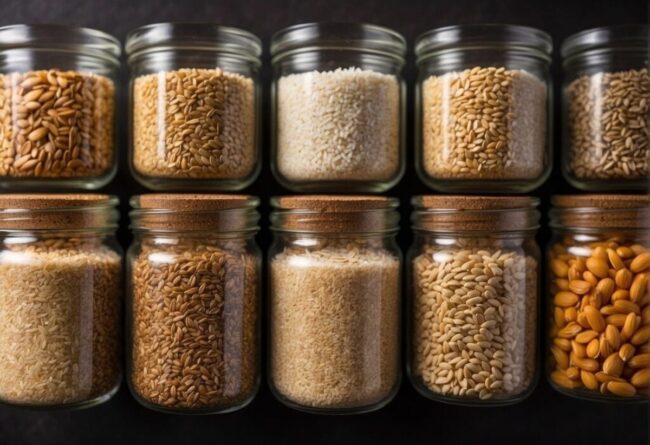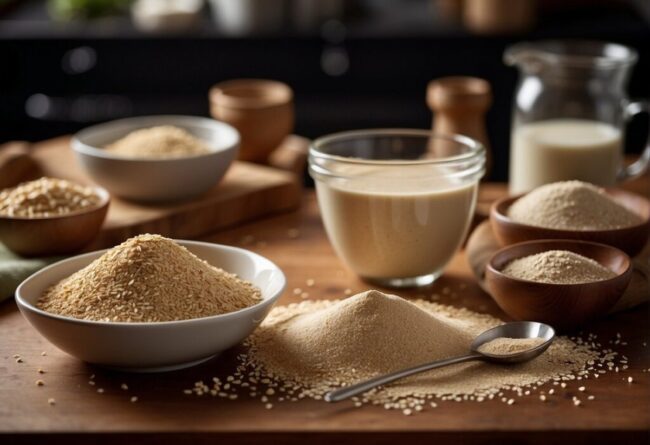3 Best Rye Substitutes for Baking and Cooking
Rye substitutes introduce a hearty, earthy grain to your recipes when traditional rye is not at hand.
An assortment of alternative grains mirrors the dense texture and rustic taste that lends authenticity to rustic breads and crackers.
Baked treats continue to boast a wholesome character steeped in tradition and simple goodness.
What to Know About Rye
Rye is a grain known for its earthy flavor and high fiber content. It is used in breads, crackers, and whiskey production.
Rye’s Nutritional Value
Rye flour stands out as a powerhouse of nutrition.
Its high fiber content supports digestive health and keeps you feeling full longer.
Packed with essential amino acids, rye contributes significantly to muscle repair and overall growth.
B-vitamins like niacin, thiamine, and riboflavin play crucial roles in energy production and metabolic processes.
Additionally, the presence of minerals such as iron and magnesium aids in oxygen transport and various bodily functions that keep you energized throughout the day.
Rye Baking Uses
Rye flour introduces a rich, earthy taste that sets it apart from other baking ingredients.
Known for its role in rye bread, this flour shines in varieties such as sourdough and pumpernickel.
Lower gluten levels contribute to a denser texture, which influences how dough rises during fermentation.
Despite the weaker gluten structure, rye can still capture carbon dioxide effectively enough to create deliciously hearty loaves.
Bakers appreciate its unique qualities that lend depth and character to their creations while providing an alternative grain experience.
Alternatives to Rye Bread
Rye bread offers a distinct flavor and texture, but alternatives can bring variety to your meals. Below are options which provide perfect tastes that can elevate your sandwiches or toast.
Wheat-Based Flours
Spelt flour stands out with its nutty essence and subtle sweetness, making it a favorite for those seeking unique flavors in their baked treats.
The earthy undertones enhance the overall taste, offering a delightful twist to traditional recipes.
Whole wheat flour brings a robust character that complements hearty breads and doughs perfectly; its density ensures satisfying bites.
Bread flour is known for its remarkable gluten strength, contributing to chewy textures that elevate yeasted creations while keeping flavors mild yet comforting.
When exploring these options in your kitchen, each choice offers distinct attributes that can elevate any baking project you undertake.
Gluten-Free Options
Buckwheat flour stands out for its gluten-free properties and a robust, nutty taste.
Perfect for pancakes and noodles, it brings a hearty element to your meals.
Rice flour offers versatility with its neutral flavor, making it an excellent choice for various baked goods when blended with other flours.
Oat flour adds a gentle sweetness while ensuring moisture in your recipes; just remember to use certified gluten-free oats if needed.
Amaranth flour packs in nutrition with its malty flavor profile and high protein content, making it an enriching addition to any dish you create.
Alternative Grain Flours
Barley flour adds a gentle sweetness, perfect for recipes that require a lighter touch.
Sorghum flour stands out as an excellent gluten-free option with its subtly sweet notes, making it a favorite in many baking mixes.
Millet flour brings its own light sweetness to the mix and shines when combined with other flours for balanced results.
Triticale flour merges the best of wheat and rye flavors while providing gluten content, enhancing texture in baked goods.
Kamut flour introduces richness with its buttery taste and higher protein levels compared to regular wheat, ensuring satisfying outcomes in your baking endeavors.
Choosing the right substitute can truly elevate your culinary creations!
Picking the Best Rye Substitute
The best rye substitute depends on the dish, with whole wheat, barley, and spelt being good alternatives. Each provides a different flavor and texture.
Taste Factors
Rye flour introduces a flavor that dances between sweet and earthy, creating a delightful depth in baked goods.
Whole wheat flour serves as an excellent alternative, bringing its own nutty sweetness to the mix while still allowing for that comforting taste.
Spelt flour adds another dimension with its gentle sweetness and nut-like undertones, making it an inviting choice for various recipes.
Buckwheat flour contributes a rich earthiness but should be used sparingly to avoid overpowering other flavors.
Experimenting with these flours opens up exciting avenues for creativity in your baking adventures!
Baking Texture and Quality
The texture of baked goods hinges on the flour choice, especially when substituting for rye.
All-purpose flour shines in recipes aimed at achieving a light and tender crumb, making it an excellent option for cakes and biscuits.
A blend of all-purpose flour with wheat gluten introduces a delightful chewiness that mimics the heartiness of rye, perfect for bread enthusiasts.
Consider how each type affects not just flavor but also mouthfeel; you want to ensure your creations have that satisfying bite.
Baking should be an adventure where you experiment with different textures to find what resonates best with your taste buds.
Nutrition Basics
Rye flour stands out for its impressive nutrition profile, featuring significant fiber and essential micronutrients.
Spelt flour serves as an excellent alternative, providing a similar boost in fiber and protein levels.
Those avoiding gluten should consider oat or buckwheat flour as viable substitutes without compromising on taste or texture.
Adjustments may be necessary when substituting flours; wet ingredient ratios often require fine-tuning to achieve the right consistency in your baked goods.
Accurate measurements play a crucial role in ensuring successful results every time you bake.
Adjusting Recipes for Rye Substitutes
Adjusting recipes for rye substitutes may require altering hydration and fermentation times. This helps maintain structure and flavor in baked goods.
Changes in Liquid Amounts
Rye flour has a unique ability to soak up liquids, which can affect your baking.
When spelt flour enters the mix, keeping the same amount as rye works well, but cutting back on liquid is essential.
Switching to all-purpose flour requires a different approach; extra liquids will help achieve that perfect dough consistency.
Gradually adding small amounts of liquid helps in fine-tuning the texture just right for your recipe.
Baking becomes an art when you know how to adjust ingredients effectively!
Baking and Rising Agents
Rye flour presents a unique challenge due to pentosans, which can slow down yeast activity and extend fermentation times.
All-purpose flour acts as a quicker alternative, reducing the waiting period for dough to rise.
Traditional leavening agents like yeast should match rye's volume for consistency in flavor and texture.
Sourdough enthusiasts will notice variations in rise time when using substitutes while still keeping their starter intact.
Adjustments may be necessary during proofing based on the substitute you select; staying attentive to your dough ensures optimal results every time.
Adding Boosters and Enhancers
Substituting rye flour can be a culinary adventure.
Spelt may not deliver the same depth, but with some thoughtful additions, your baked goods can still shine.
Sweeteners like molasses or honey introduce a rich flavor and appealing color to the mix.
For that classic rye essence, incorporating caraway seeds is essential; they bring an aromatic touch that elevates your bread’s character.
A splash of olive oil enhances moisture and softness, ensuring each bite feels satisfying and tender.
Taste tests along the way will help you adjust these elements to suit your unique palate perfectly.



